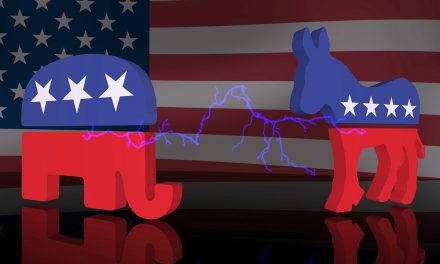Image by Colin Behrens from Pixabay
Deficit-spending and the resulting massive debt severely damages America’s economic prospects and hurts each American.
May 31, 2017 –
True, without a new budget and reforms, the stock market soared 13 percent over economic optimism in the months following the election of President Trump.
Investors were heartened by the hopeful promise of his proposed reforms such as ObamaCare, taxes and debt reduction.
But after Congress failed to make significant progress on the president’s proposals, the Dow Jones Industrial Average has stalled around 21,000 points. Investors cite a lack of progress in changing public policies.
So the U.S. still faces grave consequences. Why? Both the federal-government spending and its debt are unsafe.
Obviously, policymakers have not learned from the economic stagnation in Greece where poverty is rampant.
This domestic trend is calamitous because it represents a threat to America’s economic growth.
Without solving the fiscal mess, economic stagnation will get even worse.
So economic growth is unlikely unless major policies are implemented.
Without macro policy changes, the appalling spending and debt will continue to crowd out business and private investment.
Congressional inaction tells investors the U.S. is less likely to have tax reform and is unlikely to pay down the federal debt.
This also has cruel implications for the elderly, poor and middle class. More on that later.
Why did America fall to such economic despair?
President Obama’s dismal record on economic growth – the gross domestic product (GDP) and on debt and deficits — is the worst ever.
Along with President Obama’s record spending, the GDP in his term only averaged about 1 percent.
As a comparison during more prosperous times in the 1980s under President Reagan, GDP was usually 4 percent or higher.
Reasons for economic decline
How did America’s fiscal situation spiral out of control? The nation’s culture deteriorated.
President Obama exasperated economic conditions with his redistribution-of-wealth philosophy.
Entitlement spending exploded under the Obama Administration – programs for food stamps, health-insurance subsidies, unemployment insurance and disability assistance.
“The problem with socialism is that you eventually run out of other peoples’ money.”
-Margaret Thatcher
One in six males, aged 25-54, remained jobless. They began thinking it was better not to work because they’d lose redistribution-of-wealth government benefits.
As an example, the Obama Administration extensively aired radio commercials to encourage Americans to apply for food stamps.
In 2007, there 14 million people were on food stamps. But 44 million received food stamps in 2016.
In all, there are now 90 anti-poverty programs, 22 housing assistance programs and 17 food programs.
Climbing debt
Largely as a result of such spending, the nation’s debt jumped more than 85 percent. Over eight years, Mr. Obama’s $9-trillion deficit exceeded red-ink spending of his two predecessors combined.
Most of the government debt is in the form of U.S. Treasury bills, bonds and notes. The money is owed to foreign governments, companies and individuals.
The U.S. Treasury also owes money to Government Account securities – Social Security and other trusts. The federal government has taken money from them to finance agencies and entitlement spending.
The government has benefited from the Federal Reserve’s low interest rates because it’s been able to keep operating. Otherwise, the federal government’s budget deficits would be more noticeable to taxpayers.
Meantime, the low interest rates have been cruel to retirees who can’t earn decent interest on their savings and investments.
And with such economic uncertainty, businesses have been reluctant to invest in equipment and pay family wage salaries.
Thanks to the tepid economy and ObamaCare, business has cut payrolls. The average American work week is only 34.4 hours.
Budget proposals
So it was a breath of fresh air when President Trump’s growth budget was proposed by Office of Management and Budget Director Mick Mulvaney.
One salient goal of the budget is to encourage Americans to join the nation’s workforce and get off welfare, food stamps and other government-dependency programs.
During the 1990s, the economy and jobs soared after the collaboration between President Clinton and Speaker of the House Newt Gingrich.
They reformed welfare with tighter eligibility, time limits and requirements to search for work. Countless Americans were happier after getting jobs and leaving government assistance as the economy blossomed.
Democrats and the media claim the Trump budget damages the poor with massive budget cuts.
They continually resort to fear mongering and trumped-up political accusations.
Instead of focusing on economic issues, Democrats oppose every productive measure while trying to promote identity politics.
In reality, however, the proposed budget will enhance America’s economy and while not slashing expenditures.
But the budget certainly slows spending down. Still, federal government spending would annually jump to $5.7 trillion from $4 trillion. Over 10 years that’s a whopping $55 trillion.
During the next 10 years, proposed Medicaid expenditures would increase from $378 billion $524 billion annually.
President Trump has also launched an all-out effort to promote jobs.
Part of which would enhance business expensing in taxes, cut business tax rates and repatriate trillions of dollars that big companies have parked overseas to capitalize on reasonable tax rates.
These are all brilliant proposals.
The misdirected angst of the liberal media, Democrats and genetic-liberal tendencies will continue.
But a disciplined approach will make America great again — by shrinking the national debt and implementing other needed reforms.
From the Coach’s Corner, here are related public-policy articles:
Businesses Would Have Been Helped 5 Ways by the American Health Care Act — Passed by the House of Representatives and the bill now goes to the Senate, what will happen to employers by the repeal of ObamaCare? It turns out it will benefit employers in five ways.
No Thanks to Bad Policy and Journalists, Economic Handcuffs Coming Off — By removing handcuffs on the nation’s economy, it will continue its strong growth if we capitalize on lessons from the common-sense economic-growth policies of two late presidents.
What Bill Gates Says about Donald Trump Will Surprise You — Mr. Gates astutely observes Mr. Trump was not elected “for specific policies” but for his “kind of leadership.” The tech icon also believes Mr. Trump has a message reminiscent of President John F. Kennedy.
Analysis: Trump’s Vision to Fix Trade Deficit, Create Jobs — Donald Trump acts positively: Americans are tired of the reign of politically correct terror, the movement for income redistribution, and the massive loss of good-paying jobs.
“The problem with socialism is that you eventually run out of other peoples’ money.”
-Margaret Thatcher
__________






